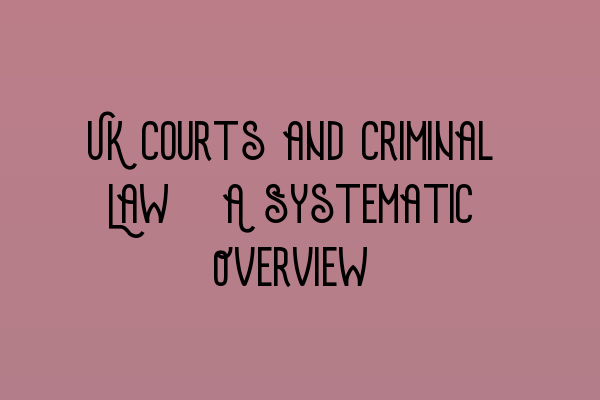UK Courts and Criminal Law: A Systematic Overview
The UK courts play a vital role in the enforcement and interpretation of criminal law. Understanding the structure and functioning of the UK courts system is fundamental for anyone involved in criminal law practice. In this article, we provide a systematic overview of the UK courts and their role in the criminal justice system.
The Structure of the UK Courts System
The UK courts system is divided into two main levels: the lower courts, also known as the Magistrates’ Courts, and the higher courts, which include the Crown Court and the appellate courts.
1. Magistrates’ Courts
The Magistrates’ Courts are the entry point for the majority of criminal cases in the UK. These courts handle less serious offenses, such as minor assaults, theft, and traffic violations. They are presided over by magistrates who are legally qualified volunteers. In some cases, such as those involving more serious crimes, the Magistrates’ Courts serve as a preliminary hearing venue before the case is transferred to the Crown Court.
2. Crown Court
The Crown Court is the higher court where more serious criminal cases are heard. This includes cases involving murder, rape, drug offenses, and complex fraud. The Crown Court consists of judges and juries, and it has the power to impose more severe penalties than the Magistrates’ Courts. The Crown Court also handles cases that have been transferred from the Magistrates’ Courts.
If a defendant is found guilty in the Crown Court, the judge will determine the appropriate sentence, taking into account the guidelines outlined in the Sentencing Council Guidelines. The judge may consider factors such as the seriousness of the offense and the defendant’s previous convictions.
3. Appellate Courts
The UK has a two-tier appellate court system: the Court of Appeal and the Supreme Court.
The Court of Appeal is divided into two divisions: the Criminal Division and the Civil Division. The Criminal Division hears appeals against convictions and sentences from the Crown Court and, in some cases, from the Magistrates’ Courts. It ensures that the trial was fair and the law was correctly interpreted and applied. The Court of Appeal has the power to uphold, quash, or vary a conviction or sentence.
The Supreme Court is the highest court in the UK and deals with cases of general public importance. While it does not normally handle criminal cases, it may hear appeals on matters of legal significance or constitutional importance.
The Role of the UK Courts in Criminal Law
The UK courts have several key roles in criminal law. They ensure that justice is served, interpret and apply the law, protect the rights of individuals, and maintain public confidence in the legal system.
First and foremost, the courts are responsible for determining the guilt or innocence of individuals accused of committing a crime. The burden of proof lies with the prosecution, who must demonstrate beyond a reasonable doubt that the defendant is guilty.
The courts also play a crucial role in interpreting and applying the law. They analyze the legislation, case law, and legal principles to ensure consistent application and fair outcomes. In doing so, they provide guidance on the interpretation and scope of criminal offenses, helping to shape the development of criminal law.
Furthermore, the courts protect the rights of individuals involved in criminal proceedings. This includes the right to a fair trial, the right to legal representation, and the protection against self-incrimination. The courts ensure that these rights are upheld and that the process is conducted in a manner that is just and fair.
Finally, the UK courts help maintain public confidence in the legal system. Through their transparent and impartial handling of cases, the courts demonstrate that justice is accessible to all and that the rule of law is upheld.
For aspiring solicitors or anyone considering a career in criminal law, understanding the UK courts system is essential. The SQE Exam Prep: Essential Study Materials for Aspiring Solicitors article provides useful resources for those preparing to take the Solicitors Qualifying Examination (SQE), which tests candidates’ knowledge of criminal law and procedure. Additionally, the Demystifying the Solicitors Qualifying Examination Format article offers insights into the format and structure of the SQE.
The SQE Exam for International Lawyers: Challenges and Success Strategies article is particularly relevant for international lawyers seeking to qualify in the UK. It outlines the unique challenges they may face and offers strategies for success in the SQE.
For entrepreneurs considering setting up a limited liability company (LLC) in the UK, the LLC Formation Made Simple: Step-by-Step Guide for UK Entrepreneurs and LLC Formation: A Step-by-Step Guide for UK Entrepreneurs articles provide comprehensive guidance on the process.
In conclusion, the UK courts system is a complex yet vital component of the criminal justice system. By understanding its structure and role, legal professionals can navigate the intricacies of criminal law practice and ensure that justice is served.
